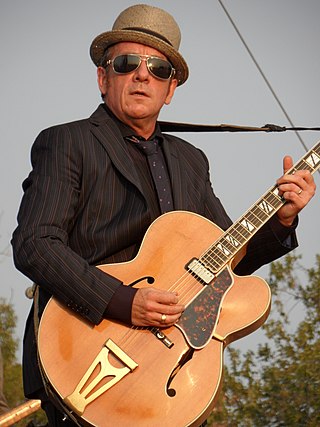
Declan Patrick MacManus, known professionally as Elvis Costello, is an English singer, songwriter, record producer, author and television presenter. Per Rolling Stone, Costello "reinvigorated the literate, lyrical traditions of Bob Dylan and Van Morrison with the raw energy and sass that were principal ethics of punk", noting the "construction of his songs, which set densely layered wordplay in an ever-expanding repertoire of styles." His first album, My Aim Is True (1977), is widely regarded as one of the best debuts in popular music history. It spawned no hit singles, but contains some of Costello's best-known songs, including the ballad "Alison". Costello's next two albums, This Year's Model (1978) and Armed Forces (1979), recorded with his backing band the Attractions, helped define the new wave genre. From late 1977 through early 1980, each of the eight singles he released reached the UK Top 30. His biggest hit single, "Oliver's Army" (1979), sold more than 400,000 copies in Britain. He has had more modest commercial success in the US, but has earned much critical praise. From 1977 through the early 2000s, Costello's albums regularly ranked high on the Village Voice Pazz & Jop critics' poll, with This Year's Model and Imperial Bedroom (1982) voted the best album of their respective years. His biggest US hit single, "Veronica" (1989), reached number 19 on the Billboard Hot 100.
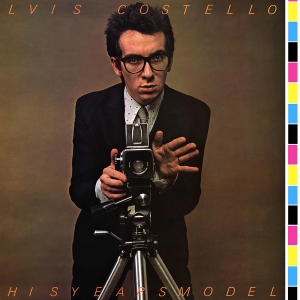
This Year's Model is the second studio album by the English singer-songwriter Elvis Costello, released on 17 March 1978 through Radar Records. After being backed by Clover for his debut album My Aim Is True (1977), Costello formed the Attractions—keyboardist Steve Nieve, bassist Bruce Thomas and drummer Pete Thomas —as his permanent backing band. Recording sessions took place at London's Eden Studios in eleven days between late 1977 and early 1978. Nick Lowe returned as producer, and Roger Béchirian acted as engineer. Most of the songs were written prior to the sessions, and debuted live during the latter half of 1977.

My Aim Is True is the debut studio album by the English singer-songwriter Elvis Costello, originally released in the United Kingdom on 22 July 1977 through Stiff Records. Produced by Stiff artist and musician Nick Lowe, the album was recorded from late 1976 to early 1977 over six four-hour studio sessions at Pathway Studios in Islington, London. The backing band was the California-based country rock act Clover, who were uncredited on the original release due to contractual difficulties. At the time performing as D.P. Costello, Costello changed his name to Elvis after Elvis Presley at the suggestion of the label, and adjusted his image to match the rising punk rock movement.
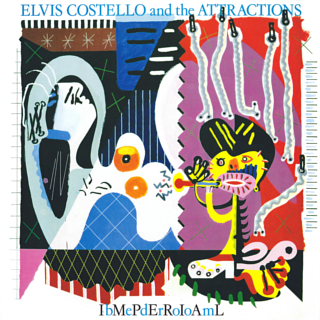
Imperial Bedroom is the seventh studio album by the English singer-songwriter Elvis Costello, and his sixth with the Attractions—keyboardist Steve Nieve, bassist Bruce Thomas and drummer Pete Thomas. It was released on 2 July 1982 through F-Beat Records in the United Kingdom and Columbia Records in the United States. Recording took place at AIR Studios in London from late 1981 to early 1982 with production handled by Geoff Emerick. Placing an emphasis on studio experimentation, the album saw the group use unusual instruments, including harpsichord, accordion and strings arranged by Nieve. Songs were rewritten constantly while Costello tinkered with the recordings, adding numerous overdubs.

Punch the Clock is the eighth studio album by the English singer-songwriter Elvis Costello, and his seventh with the Attractions—keyboardist Steve Nieve, bassist Bruce Thomas and drummer Pete Thomas. It was released on 5 August 1983 through F-Beat Records in the United Kingdom and Columbia Records in the United States. Produced by Clive Langer and Alan Winstanley, the album was Costello's attempt at making a commercial record following years of dwindling commercial success. It was recorded at London's AIR Studios in early 1983 and features contributions from the TKO Horns and Afrodiziak.

King of America is the tenth studio album by the English singer-songwriter Elvis Costello, released on 21 February 1986. Co-produced by Costello and T Bone Burnett, the album originated following a series of tours the two made under the name "the Coward Brothers". Recording took place in mid-1985 at various studios in Los Angeles, California, with a group of American session musicians dubbed "the Confederates". Selected by Burnett, they included Ray Brown, Earl Palmer and former members of Elvis Presley's TCB Band. Costello's regular backing band, the Attractions, were intended to appear on half of the album before poor sessions led to them appearing on only one track, "Suit of Lights".
Bruce Thomas is an English bass guitarist, best known as bassist for the Attractions; the band formed in 1977 to back Elvis Costello in concert and on record.
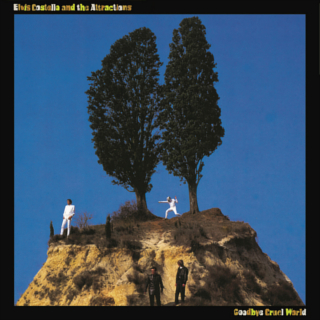
Goodbye Cruel World is the ninth studio album by the English singer-songwriter Elvis Costello, and his eighth with the Attractions—keyboardist Steve Nieve, bassist Bruce Thomas and drummer Pete Thomas. It was released on 18 June 1984 through F-Beat Records in the United Kingdom and Columbia Records in the United States. Produced by Clive Langer and Alan Winstanley, who returned from 1983's Punch the Clock, the album was recorded at London's Sarm West Studios in March 1984 during a period of turmoil for the artist. The problematic sessions included disagreements between Costello and the producers over the album's direction and high tensions amongst the Attractions.

The Delivery Man is the 21st studio album by Elvis Costello, released on 21 September 2004 through Lost Highway Records. It was recorded with the Imposters at Sweet Tea Studio in Oxford, Mississippi. It peaked at No. 40 on the Billboard 200.

All This Useless Beauty is the seventeenth studio album by the English singer-songwriter Elvis Costello, released in 1996 by Warner Bros. Records. It is his tenth and final album with his long-standing backing band the Attractions, and the last album he delivered under his contract to the Warner Bros. label, his contract expiring with a further compilation album, Extreme Honey. It peaked at number 28 on the UK album chart, and at number 53 on the Billboard 200.

Kojak Variety is an album by English musician Elvis Costello, released in 1995 through Warner Bros. Records. It is composed of cover songs written by others. In 2004, Rhino Records reissued an expanded, double-CD version of the album, containing a bonus disc.
"Almost Blue" is a song recorded by English group Elvis Costello and the Attractions from their sixth studio album, Imperial Bedroom (1982). Written by Costello and produced by Geoff Emerick, the track shares the name of the group's previous 1981 studio album. It was released on 2 July 1982 along with the rest of Imperial Bedroom, and would later be included on side two of The Best of Elvis Costello and the Attractions (1985). A traditional pop song, "Almost Blue" contains lyrics that compare a former relationship to a present one.

"(I Don't Want to Go to) Chelsea" is a song written by new wave musician Elvis Costello and recorded by Costello with his backing band the Attractions. The song appeared on Costello's 1978 second album, This Year's Model. Written by Costello while working as a computer programmer, the song was lyrically inspired by films Costello had been watching as well as childhood trips to Chelsea. Musically the song featured influence from bands such as the Who and the Kinks and is notable for Bruce Thomas's prominent bassline.

"New Amsterdam" is a song written and performed by new wave musician Elvis Costello on his 1980 album, Get Happy!! Written about the New World and New York, the recording of the song that appears on Get Happy!! was a demo that Costello had recorded in Pimlico.

"The Only Flame in Town" is a song written by new wave musician Elvis Costello and recorded by Costello with his backing band the Attractions. The song appeared on Costello's 1984 album, Goodbye Cruel World. Originally written in the style of a classic torch song, "The Only Flame in Town" was reworked by producers Clive Langer and Alan Winstanley in a more pop-friendly style. This final version features Daryl Hall of Hall & Oates on backing vocals.

"Brilliant Mistake" is a song written and performed by new wave musician Elvis Costello that was first released on his 1986 album King of America. Written about Costello's experiences in America, the song features introspective lyrics and a performance from the Confederates, who performed on the track after his usual backing band the Attractions could not perform to Costello's liking.
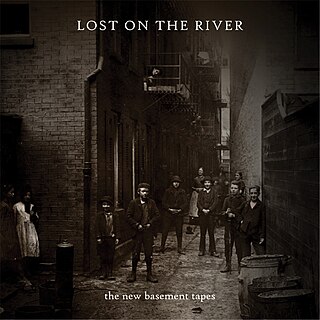
Lost on the River: The New Basement Tapes is an album produced by T Bone Burnett featuring a collective of musicians recording under the moniker The New Basement Tapes—Elvis Costello, Rhiannon Giddens, Taylor Goldsmith, Jim James and Marcus Mumford.

Forever Words is a 2018 album by various artists recording poetry and lyrics by Johnny Cash set to music for the first time. The album follows a 2016 book release of the poems entitled Forever Words: The Unknown Poems (ISBN 0399575138). The album includes a posthumously released track by Chris Cornell, who died in 2017. In 2020 and 2021, a deluxe version of the album was released in four waves, with a total of 18 additional songs. The first and second waves were released on October 23 and December 11, 2020 with the two remaining waves set for release on February 5 and April 2, 2021 respectively.
"The Other End (Of the Telescope)" is a song by American band 'Til Tuesday, which was released in 1988 on their third and final studio album Everything's Different Now. The song was written by Aimee Mann and Elvis Costello. Costello recorded his own version of the song for his 1996 album All This Useless Beauty.
"Indoor Fireworks" is a song written and performed by new wave musician Elvis Costello that was first released on his 1986 album King of America. Written as a eulogy for a broken relationship, the song utilizes a central metaphor of fireworks and took inspiration from Costello's failed marriage. On the song, Costello is supplemented by the studio professionals of the Confederates, as on most of King of America.
















